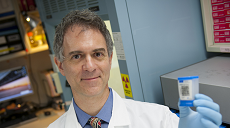FDA approves lifesaving test for tuberculosis

A health scourge once considered to be largely contained in the United States has made an alarming resurgence in parts of the country. Recent tuberculosis outbreaks – including an episode in South Carolina that infected 53 children – have brought renewed attention to the need to remain vigilant against that potentially deadly disease.
To combat the public health threat both here and especially around the world, a Rutgers New Jersey Medical School immunologist has developed a test that can rapidly diagnose and classify the disease in a fraction of the time needed by previous technology. Experts agree that a speedy diagnosis can both limit infections and save lives.
Rutgers Today talked to David Alland, director of the Center for Emerging Pathogens at Rutgers New Jersey Medical School, about his many years of work developing the test – called the Xpert MTB/RIF Assay – endorsed by the World Health Organization in 2010. The Food and Drug Administration approved the new diagnostic tool in late July for use in the U.S.
Rutgers Today: How does the newly approved test advance the diagnosis of TB?
Alland: The existing technology is a labor-intensive system that involves examining separate samples of saliva on a series of slides under a microscope, and results may not be available for a week or more. Using the system we developed and the FDA just approved results come back within two hours. In addition to being quick, our system detects TB more reliably, while also determining whether the strain of TB found in a patient is drug resistant, something the old technology could not do.
Rutgers Today: Why is it so important to know whether a case of TB is drug resistant?
Alland: If you have multi-drug resistant TB and you don't get the appropriate treatment for it, your chances of dying are about 50 percent, and of course you remain contagious. Fortunately, there are now some drugs that appear to work pretty well for strains of tuberculosis that might have been considered totally drug resistant just a few years ago. But those treatments are both toxic and lengthy, and it takes a lot of courage for a patient to endure them. They only should be used in patients who clearly need them, so getting an accurate diagnosis is critical.
Rutgers Today: Now that the FDA has approved its use in the United States, how will the test change treatment for patients suspected of having TB?
Alland: Up until now, when TB has been suspected, patients have needed to be kept in hospital isolation wards for the several days that it takes for microscope testing to be completed. Not only is it extremely expensive to keep a patient hospitalized for that length of time, but patients in isolation rooms tend to be treated less attentively, and their conditions can easily deteriorate there. With a quick diagnosis, in theory we can rule out TB for some patients in the emergency room before we even have to put them in isolation, and patients who are infected can start receiving appropriate treatment immediately. That helps both the patient and the health care system's bottom line.
Rutgers Today: The test is already in use in much of the rest of the world. Has it proven itself?
Alland: Its ability to save lives has been documented. The World Health Organization (WHO) reports that for every 100 patients with HIV who are diagnosed with my test there is one more life saved compared with how TB was diagnosed before. People whose immune systems are compromised by HIV are especially vulnerable if they contract TB. With more than one million new cases of people with combined HIV and tuberculosis reported each year, if more people can be tested and then treated, the numbers of lives saved can be huge.
Rutgers Today: What's next?
Alland: We are developing a new generation of the test that not only detects multiple drug resistance in TB, but will be able to pinpoint which specific drugs are resisted and which are not. Also, some of the techniques we've used for TB are now being used to develop a test for fungal sepsis, which is a major problem for debilitated hospitalized patients, including transplant patients and cancer patients. That test is looking very promising. We also have a panel of very sensitive tests for bioterrorism agents such as anthrax and tularemia that could be ready to roll out if this country is ever attacked with those agents.
















